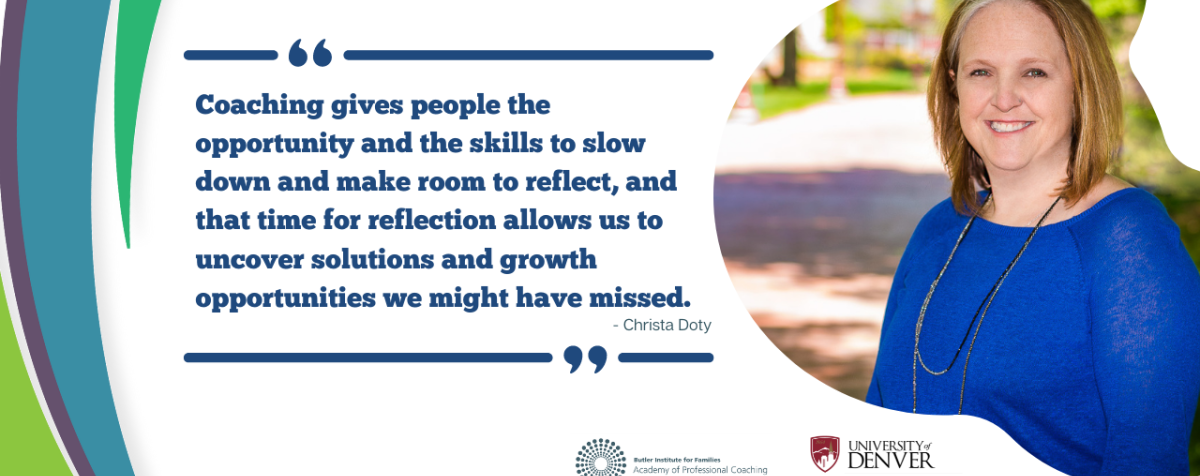3 Things I Learned in My Coaching Program
Christa Doty | March 2022
Eight years ago, I was mid-career and mid-life. My career in social work continued to be meaningful though a little rote. I didn’t want to “move up” into administration because what I loved to do was work with people and facilitate change directly, but I was itching to grow and try new things. While I could be content with my place at Butler, I kept asking myself, “Was this it for the next 25 years?”
This self-reflection got underway just as coaching started gaining steam as a mainstream profession. Popular in the corporate world for years, coaching was beginning to be seen as a good investment to support and retain the workforce in the government and nonprofit world where I made my home.
With my background in social work, coupled with my experiences training new workers and seasoned staff, coaching seemed like a perfect path to connect my interests in on-the-ground changemaking. I started “coaching” and something was missing. Yes, we were coming up with ideas to solve a problem, but it seemed as if the coaching sessions lacked depth. We were staying on the surface and not unpacking the nuanced layers beneath where real change could happen in various projects but quickly realized something. It became clear I needed to dig deeper into this coaching thing.
Even with my newfound curiosity and an opportunity to attend an accredited International Coaching Federation coaching school, I still went to the first day of class thinking that since I had been in the “helping” field for 20 years, all I needed to do was “check the boxes.”
I couldn’t have been more wrong.
While I did have some foundational knowledge that prepared me for the coaching practice—a formal education focused on human development and change management, as well as various work roles that offered opportunities to cultivate empathy and self-awareness—, by going through a formal coaching program, I not only learned to pivot those skills to be used in different ways; I was profoundly changed by the experience.
The coaching program I joined uncovered three epiphanies that have transformed my work as a professional coach:
- Coach the person, not the problem. In my earlier “coaching” work, something was missing in the sessions, and through a formal coaching program, I realized I was focusing on the problem and not the whole person. We are not compartmentalized entities that come to work but whole beings with values, beliefs, and cultural experiences that influence how we approach and interact in situations. To be a coach is to honor the whole person and bring that perspective into any interaction.
- There are little agendas and big agendas, and we often confuse the two. People come to coaching wanting answers. Often, they have a presenting problem, and that becomes their focus. In reality, the presenting problem is just the little agenda. The big agenda is what lives behind the presenting problem – what value is being stepped on, what aspiration is not being fulfilled, how the individual may be inadvertently influencing the situation. As a coach, I can help someone’s little agenda through exploring and working on the big agenda.
- Be open to magical transformations—no matter your age. Part of being a coach is doing the work ourselves. Through my coaching program, I learned how to honor all my brilliance and accomplishments, while at the same time recognizing areas where I was still holding back—even in my 50s. I was able to recognize that my value of humility was getting in the way of also sharing my expertise with confidence. My deeply held belief in being grateful for the “here and now” had become an excuse to not push myself to communicate my needs in relationships so that they could continue to deepen and grow. Coaching helped me be open to magical transformation.
I had thought being mid-career and mid-life, I was using my skills at their optimal level, that I knew myself and I had 90% of my life figured out. By going through a formal coaching program, I gathered tools to reframe this thinking. A fulfilling life, in fact, wasn’t about a percentage system; it was more like sediments in a rock building each layer to make me stronger and more resilient.
Coaching encouraged me to approach life with a “both/and” mindset. I can know myself and be successful and satisfied while at the same time remain open to pushing myself to grow. So much of our modern culture focuses on movement, chasing the next big thing, and living in reaction mode. Coaching gives people the opportunity and the skills to slow down and make room to reflect, and that time for reflection allows us to uncover solutions and growth opportunities we might have missed.
Coaching helped me see a path for myself for the next 25 years, one where I can keep building the layers of my mountain as I grow and learn.

